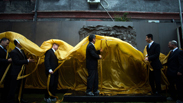
Shanghai museum unveils wall commemorating WWII Jewish refugees
Some 20,000 Jewish refugees fled Europe for China during World War II: 'Shanghai was the only city that opened its gates for Jewish refugees. We will never forget what this city has done for us.'
Shanghai Jewish Refugees Museum unveiled Tuesday a 34-meter long wall engraved with the names of 13,732 Jews who fled the horrors of Nazi Europe during World War II to find refuge in China.
According to Chinese news agency Xinhua, the wall was built on the grounds of the former site of Ohel Moshe Synagogue. The commemoration wall was unveiled a day before China marked the 69-year anniversary for its victory over Japan.
"The list of names is very meaningful as all these refugees survived extremely difficult days during the war and found refuge in Shanghai," said Sonja Muhlberger, 75-year old activist who was born to a family of Jewish refugees in Shanghai in 1939.
The names of her family members are also on the list of Jewish refugees who arrived in Shanghai between the years 1938-1947. Muhlberger stressed that "Shanghai was the only city that opened its gates for Jewish refugees. We will never forget what this city has done for us".
Some 20,000 Jewish refugees fled Europe and arrived to Shanghai during World War II via two major routes – through the sea from Europe to south-east Asia and from eastern Europe via trains from Siberia to north-east China.
According to Shanghai Daily, many of the names came from the book “Exile Shanghai 1938-47,” which Muhlberger edited in 2000. The list in the book was compiled by three teenage Jewish girls employed by the Japanese forces that occupied Tilanqiao during the war.
“The stated purpose of the exercise was census taking, but the Jewish girls didn’t give all the correct names as they doubted its true purpose,” Muhlberger said.
The 75-year-old said she got the list from a man, originally from Vienna, who stole it from the Japanese police bureau.
"I remember a type of insecurity among the adults and nobody knew what was happening with their relatives back in Europe. However, if they had not been deported to China, I would not be able to talk about an important part of the Jewish history," added Muhlberger.










